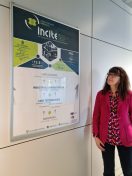SUCCESS STORY #2: ENDURA
Family business with an international presence
 Endura, a family-owned company, was founded more than 40 years ago and has been developing R&D activities for 20 years. Headquartered in Bologna, it has R&D offices and a production site in Ravenna, Italy. It also has a production site in India for the Asian and East Asian market, and commercial offices in South and North America. Chaired by the founder’s son, members of the second and third generation are involved in the business operations.
Endura, a family-owned company, was founded more than 40 years ago and has been developing R&D activities for 20 years. Headquartered in Bologna, it has R&D offices and a production site in Ravenna, Italy. It also has a production site in India for the Asian and East Asian market, and commercial offices in South and North America. Chaired by the founder’s son, members of the second and third generation are involved in the business operations.
Focusing on innovative insecticidal compounds, Piperonyl Butoxide (PBO), its main compound, is found in most insect control products used in homes, gardening, small fields, and professional pest control. This compound has a synergic profile, helping to interfere with insect metabolism.
What does innovation represent for ENDURA?
 Carla Marchioro, PhD in Chemistry and head of Endura’s R&D team, commented that “innovation is about finding ways to solve problems differently, ensuring novelty, and that these solutions bring better, more efficient or faster products to the market. As these compounds interact with biology, which is affected by constantly changing climatic conditions, being innovative is a market requirement. This requires not only finding new compounds, but also those with the best environmental, technical and human health safety profile.”
Carla Marchioro, PhD in Chemistry and head of Endura’s R&D team, commented that “innovation is about finding ways to solve problems differently, ensuring novelty, and that these solutions bring better, more efficient or faster products to the market. As these compounds interact with biology, which is affected by constantly changing climatic conditions, being innovative is a market requirement. This requires not only finding new compounds, but also those with the best environmental, technical and human health safety profile.”
Endura is constantly improving its activities and products. It is a company that is taking care of the environment and humans’ health.
Why does ENDURA participate in the INCITE project?
There was already an existing collaborative relationship with some members of the INCITE consortium, such as Fraunhofer, BiCT and VITO, explained Carla Marchioro. This helps in integrating a project with several partners because not only goals are shared, but also visions. Moreover, European projects like INCITE present an opportunity to work with other organisations.
Carla Marchioro added that this SPIRE call was interesting because it aimed a specific application – the production of a prototype. The possibility of having a grant to realise this was considered as important.
How are the first biocatalysis trials for agrochemicals going?
Despite some problems with the delay in the supply of materials, the project is focused to be on track. But as it is a large project, it also requires a lot of effort, and the enzymatic step is only one part of the entire process.
The demonstration plant for this agrochemical pathway to be built within the INCITE project will be the first plant of its kind in Europe, making them the only producers of desired compounds by new methodology in Europe and worldwide. Carla concluded that “the project is precious because it generates knowledge and new technologies”.
Key figures
Some key figures showing Endura’s impact in the domain of R&D and production of active ingredients and synergists for household insecticide products:
- More than 100 employees in Italy
- 20 people in the R&D team
- 2 production units (1 in Italy, 1 in India)
- Sales offices across different countries





